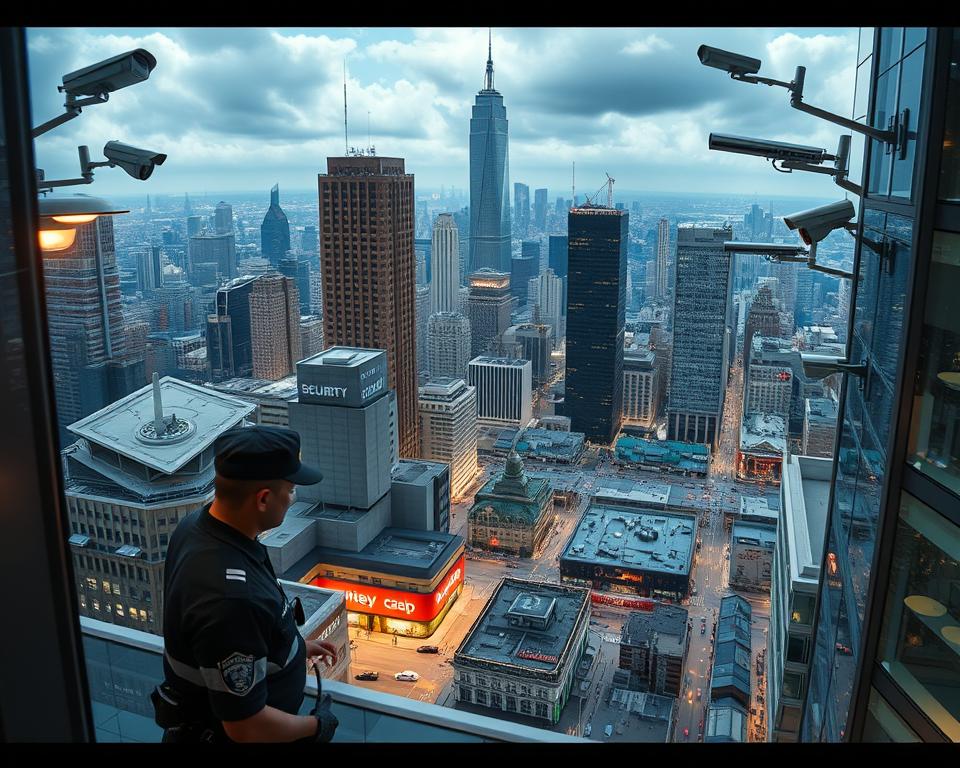Enhancing Security through Hospital Security Guards
Did you know that hospitals face an average of 30 violent incidents daily? This alarming figure highlights the essential role of Hospital Security Guards. They safeguard not only patients but also personnel and private data. In the rapidly evolving health sector, strong Healthcare Facility Security is paramount. It involves establishing secure environments where patients receive care free from violence or privacy risks.
Partnering with experienced firms like Divine Protection Services enhances Medical Center Security Services. This makes sure that safety is prioritized without blocking access. This guide looks at how business security approaches and monitoring tools can markedly upgrade safety measures. It addresses both inside and outside dangers efficiently.

Important Discoveries
- Hospital Security Guards serve a critical function in shielding patients, employees, and private data.
- Healthcare Facility Security is necessary to curb violence and preserve confidentiality.
- Unified security platforms improve the total impact of medical center protection services.
- Collaboration with firms like Divine Protection Services ensures tailored security solutions.
- State-of-the-art technologies are the foundation of present-day healthcare security solutions.
- Managing openness and privacy is crucial for efficient hospital security standards.
Why Hospital Security Matters
Hospital security is essential for ensuring patient and personnel safety, along with safeguarding confidential data. The rise in violence in medical settings highlights the need for strong Hospital Security Guards. Such guards are crucial for sustaining a protected atmosphere and preserving the rights and dignity of all.
Enforcing robust Healthcare Facility Security plans is fundamental to stop violent behavior. This helps in creating a compassionate environment, improving the patient and family experience. It also ensures compliance with laws like HIPAA, which mandates secure access control to protect Protected Health Information (PHI). Such measures not only safeguard patients but also foster trust between healthcare providers and their communities.
| Security Measure Type | Importance | Regulatory Conformity |
|---|---|---|
| Access Control Systems | Restrict unauthorized entry and access | Vital for meeting HIPAA requirements |
| Surveillance Cameras | Observe events and prevent illicit acts | Aids in meeting safety regulations |
| Emergency Response Plans | Provide quick responses to incidents | Compliant with safety and emergency management guidelines |
| Training for Security Personnel | Train employees in crisis response skills | Meets required safety and security norms |
Committing to comprehensive security solutions and staff training is indispensable for protecting hospitals and health centers. These protocols ensure a safe and compliant environment, vital for delivering quality patient care.
Duties of Hospital Security Guards
Hospital security guards play a vital role in keeping healthcare facilities safe. They oversee entry points to deter unauthorized access, manage emergencies, and employ conflict resolution to avert dangers. Trained by Divine Protection Services, they recognize and mitigate signs of distress or violence.
Their presence is key to the safety and well-being of patients and staff. They defend the facility’s operations, necessary for a restorative environment. By maintaining safety, they enhance the patient experience and minimize hazards.
Advanced Technologies in Hospital Security
Modern healthcare environments increasingly rely on Advanced Technologies to bolster security measures. Medical Center Security Services skillfully combine technologies such as AI-enabled cameras to boost monitoring functions. Such cameras provide live tracking and analytics, allowing teams to detect and address risks promptly.
One of the key aspects of Healthcare Security Solutions is the use of access control systems. These solutions confine entry to restricted areas, ensuring that only sanctioned personnel can access crucial sections. Using biometric authentication, hospitals can incorporate another layer of protection for sensitive patient data and essential medical gear.
AI-based security tools serve a critical function in physical protection. Facial recognition and behavior detection enable security personnel to respond promptly to security breaches. Enhanced video analytics underpin strategic decisions, ensuring uninterrupted surveillance of medical facilities. This fosters a secure environment for both patients and employees.
| Innovation | Use Case | Benefits |
|---|---|---|
| AI-driven Surveillance | Real-time monitoring | Quick risk detection |
| Access Control Systems | Restricted entry | Protection of sensitive areas |
| Facial Recognition | Biometric verification | Blocking illicit entry |
| Video Analytics | Activity analysis | Data-driven decision-making |
Leading Technologies do more than guard hospital resources—they also build a protected atmosphere for all. By allocating resources to these innovative tools, medical centers can stay alert to security risks. This ensures a high standard of care for patients.
Healthcare Security Methods
Effective Healthcare Facility Security strategies are essential for safeguarding patients, staff, and visitors in medical centers. Carrying out in-depth risk reviews is the bedrock of these methods. By detecting flaws, healthcare institutions can formulate specialized plans for various cases. This boosts their readiness for any incidents that may occur.
It’s crucial to promote the reporting of suspicious activities and dangers. Medical centers need frameworks in place to react swiftly to those reports. This forward-thinking approach in Healthcare Facility Security fosters a culture of collective safety.
Visitor management is a critical aspect of Medical Center Security Services. Verifying that only approved individuals enter sustains a protected environment. Overseeing exchanges between patients and medical staff further reduces threats. This ensures a safer environment for everyone. Below you’ll find a table showcasing central aspects of strong security strategies.
| Security Module | Description | Outcomes |
|---|---|---|
| Risk Assessments | Spotting weaknesses and evaluating potential hazards. | Enhances readiness and reaction speed. |
| Incident Reporting | Prompting stakeholders to report odd conduct. | Promotes prompt action against risks and raises alertness. |
| Visitor Management | Guidelines for supervising and restricting access to sites. | Fortifies security and lessens unapproved entry. |
| Staff Training | Offering safety training to staff members. | Arms employees with skills for responding to security situations. |
Training Security Personnel Effectively
Effective training for healthcare security personnel is key to maintaining safety in hospitals. Continuous education helps staff adapt to new challenges. It also boosts their ability to respond well in different situations.
Divine Protection Services highlights nurturing excellent situational awareness in security officers. This encompasses mastering conflict resolution techniques for tense interactions. Frequent drills and mock scenarios strengthen procedures. Personnel gain the ability to handle risks swiftly while maintaining respect and dignity.
This style of coaching security personnel surpasses simple defensive measures. It nurtures a culture of protection and expertise in hospital settings. By zeroing in on core skills, healthcare facilities ensure their security teams confront issues effectively.
Adhering to Regulatory Standards
Compliance with Regulatory Standards is essential for healthcare facilities aiming to ensure security and trust. For example, HIPAA mandates stringent access controls to safeguard Patient Health Information (PHI). These procedures stop unapproved access and guard against data leaks.
Medical centers can enhance their compliance by implementing comprehensive policies. They encompass routine inspections, employee education, and explicit incident reporting methods. These practices not only safeguard patient health but also cultivate community trust.
Agencies like Divine Protection Services supply bespoke compliance strategies for hospitals. Their proficiency in Hospital Security Services assures that security personnel are able to satisfy regulatory demands.
Adherence to compliance lessens risks and cultivates robust patient-provider relationships. An anticipatory approach to regulations advantages the whole healthcare framework.
Hospital Security Officers in Practice
Hospital Security Staff serve a key function in keeping healthcare settings secure. Their work is seen in many real-life situations, showing their proactive approach. In one case, they address altercations in reception areas, promptly de-escalating them to impede violence.
During critical situations, these guards accompany people to secure spots, aiding them when needed. This measure shields those at risk and preserves a peaceful setting. Their partnership with law enforcement during emergencies highlights the significance of Professional Healthcare Security. They usually function as the primary responders.
Instruction from Divine Protection Services equips these guards to manage crises effectively. They gain abilities to implement rules while safeguarding everyone’s dignity. This mix of command and empathy positions them as essential parts of the healthcare team. They strive to guarantee protection and security for all individuals in the facility.
Personalizing Security Solutions for Healthcare Settings
Hospitals deal with particular security threats that call for a bespoke strategy. Tailoring Security Solutions is essential for confronting these matters, ensuring safety for both patients and staff. Partnering with professionals like Divine Protection Services lets hospitals design security programs suited to their unique demands.
A holistic security strategy encompasses vital domains like violence avoidance and pharmacy protection. By leveraging cutting-edge technology, hospitals can improve their security approaches while meeting HIPAA requirements. This usually entails visitor management platforms and dynamic access control solutions that adjust to evolving demands.
The duties of Medical Facility Guards are critical as well. They benefit from targeted training to deal with security episodes and ensure sustained vigilance. Their presence fends off risks and comforts both staff and patients.
The following table demonstrates how Personalizing Security Solutions tackles diverse healthcare issues:
| Challenge | Tailored Approach |
|---|---|
| Violence Prevention | Educating Medical Facility Guards in conflict de-escalation methods |
| Medication Security | Implementing locked pharmaceutical storage and tracking mechanisms |
| Visitor Management | Sophisticated guest screening and ID badge protocols |
| Access Control | Dynamic access control solutions responsive to hospital usage patterns |
By strategic preparation and teaming up with the appropriate entities, hospitals can create a robust security framework. This results from Tailoring Security Solutions to their specific criteria. Uniting careful human monitoring with tech solutions substantially bolsters security, creating a safer, more effective healthcare space.
Conclusion
Guaranteeing the protection and welfare of patients, employees, and private data is essential in medical centers. Hospital Security Guards now use advanced technologies and training to combat modern threats. This advancement not only shields physical premises but also strengthens trust between patients and healthcare professionals.
Adapted Healthcare Security Solutions assist hospitals in remaining at the forefront of the changing security scene. Joining forces with established entities such as Divine Protection Services enables healthcare institutions to tackle safety worries adeptly. By blending personnel training with cutting-edge technology, hospitals can foster a secure environment for healing and care.
The healthcare sector faces growing risks, making professional security measures indispensable. Hospitals have to integrate these progressing strategies to fortify their environments and uphold operational honor.

